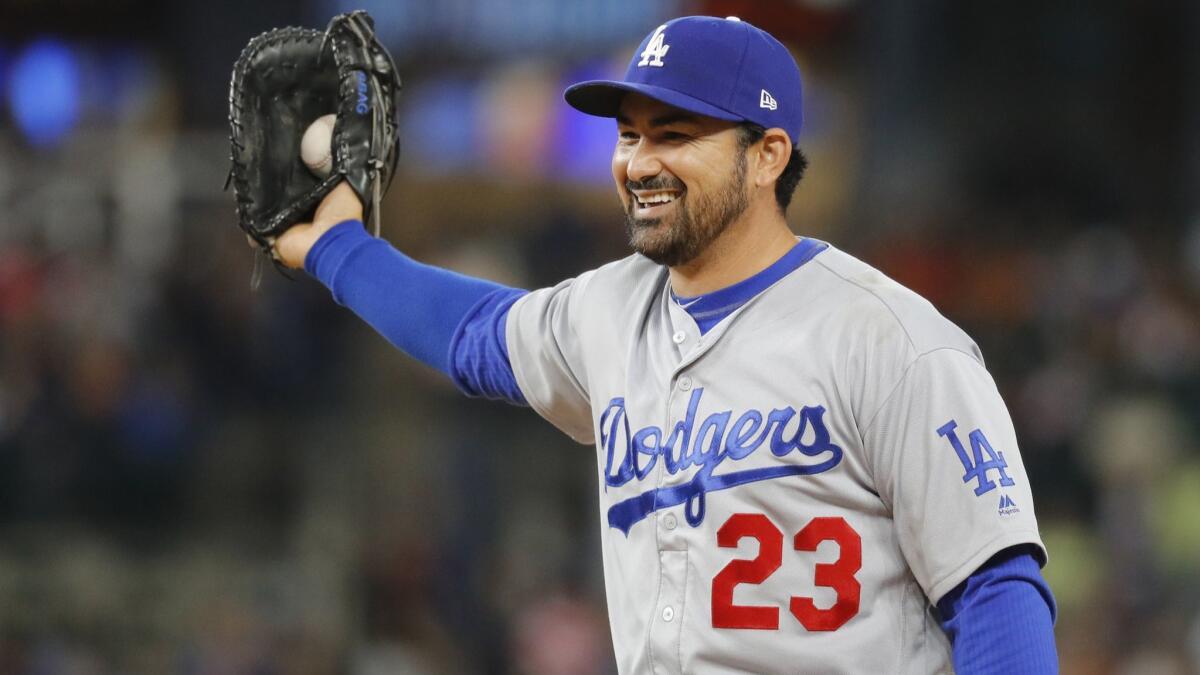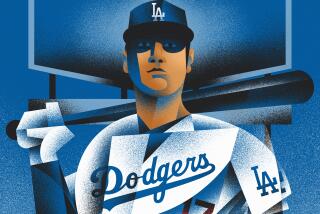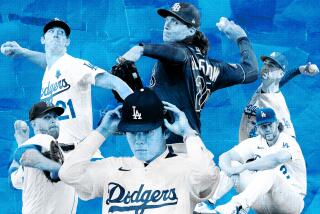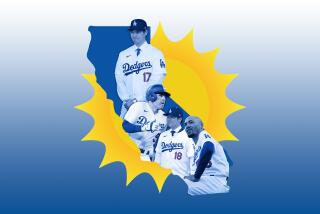Column: Adrian Gonzalez has ties to Dodgers and Red Sox; guess who he’s rooting for?

Adrian Gonzalez occasionally thinks of the 2013 season, when the Dodgers had what he considers the best team for which he ever played.
Gonzalez remains convinced the Dodgers would have advanced to the World Series if an inside fastball hadn’t fractured one of Hanley Ramirez’s ribs in the opening game of the National League Championship Series against St. Louis.
“You just think the impact that he would have had in that series if he was healthy,” Gonzalez said.
And if they had reached the World Series, whom would the Dodgers have taken on? Gonzalez’s previous team, the Boston Red Sox.
Five years later the matchup has materialized, only Gonzalez isn’t here. He is home in Los Angeles with his wife and two daughters, now a 36-year-old free agent working out with the intention of playing next season.
Ask if it was a disappointment to not be at Fenway Park this week, Gonzalez said that wasn’t the case.
“A disappointment?” Gonzalez said by phone. “I don’t know if that’s the right word. I feel like because I still am an active player and still focused on getting ready for next year, I can’t sit here and dwell on that.”
Instead of thinking of what he’s missing, Gonzalez wants to celebrate the achievements of his former teammates.
“You always want to cheer for your friends,” he said. “And I live in L.A. I definitely feel like more a part of that team than I do the Red Sox at this point. So going into the World Series here, I will definitely cheer for the Dodgers.
“I don’t want that to be heard the wrong way. I still love the Red Sox and the Red Sox organization, but I spent five years [in Los Angeles] and have so many friends on the Dodgers.”
Gonzalez deserved to be a part of this, or something like this.
He was — actually, still is — a symbol of the Dodgers under Guggenheim Baseball Management, the deep-pocketed ownership group that purchased the franchise for a record $2.15 billion from cash-strapped Frank McCourt.
His offensive production established a standard of consistency for a team that has won six consecutive division championships. His involvement in the community realized an organizational ideal.
His acquisition from the Red Sox alone was a major statement.
“To see them make that move, it sent a message to us right away that it was going to be all about winning,” closer Kenley Jansen recalled.
The Dodgers made Gonzalez a trade target shortly after the sale of the team was finalized in May 2012. “He was a fit in so many ways,” team president Stan Kasten said.
Gonzalez was a first baseman with power. He was a solid defender. And like a significant percentage of the Dodgers fan base, he was Mexican American and bilingual.
The Dodgers approached the Red Sox about a trade early in the 2012 season.
They revisited the possibility leading up to the July 31 non-waiver trade deadline. They acquired Ramirez instead.
At an owners meeting in Denver the following month, principal owner Mark Walter was lamenting the inability to close a deal for Gonzalez and remarked to Kasten about how much he would pay to acquire the five-time All-Star.
“Well, there is a way to do that,” Kasten recalled telling him.
The Dodgers would have to take on more than $260 million in salary obligations. In addition to inheriting the $127 million the Red Sox owed to Gonzalez over the following six seasons, the Dodgers would have to absorb the $102.5 million committed to injury-prone outfielder Carl Crawford over the next five years and the $31.5 million to right-hander Josh Beckett over the next two.
Walter told Kasten to go for it.
The finances weren’t the only tricky part of the transaction, in which the Red Sox also sent utilityman Nick Punto to the Dodgers in exchange for a package that included first baseman James Loney and four minor leaguers. Because the non-waiver trade deadline had expired, the players involved would have to clear waivers and be claimed on waivers by the Dodgers.
The deal was completed Aug. 25.
“I didn’t believe it in the beginning,” Jansen said. “Then I called my agent and he was like, ‘Yeah, this is going down.’ ”
The trade changed not only what was expected of the Dodgers at the trade deadline, but also what they expected from themselves. Blockbuster deals have become the norm, with the team acquiring Manny Machado this year and Yu Darvish the year before.
The deal also changed Gonzalez’s career. Boston wasn’t especially fond of Gonzalez, regardless of how much he said he enjoyed playing there. He was part of a team that missed the 2011 postseason because of a shocking late-season crash and was a disaster in 2012.
Los Angeles offered Gonzalez a chance to start over. The demographics of his new home were similar to that of San Diego, where he was born and still maintained his offseason residence. The city embraced him.
“I can relate to the fans and I feel like the fans can relate to me,” Gonzalez said. “I’m not this super talented guy that hits the ball 800 feet and runs faster than anybody else. I’m just any of the other guys here in L.A. that has to work really hard and put myself in a position where I can be ahead of the opposition mentally to compete and play at that high level.”
With their newfound financial flexibility, the Red Sox won the World Series in 2013. The Dodgers missed the playoffs in 2012, but their run of division championships started the next year.
Over five-plus seasons with the Dodgers, Gonzalez posted a .280 average with 101 home runs and 448 runs batted in. He drove in 116 runs in 2014, more than any other player in the majors.
“It’s definitely, by far, not even close, the best owners I’ve played for,” Gonzalez said. “I think all the credit should always be directed to the group of owners. You can credit the players, you can credit the coaches at the time, the front office at the time, but that has changed. That has not been consistent. The one thing that has been consistent has been the ownership and their commitment to making sure the team is in the best position possible.”
And that was why Gonzalez was determined to make his departure from the Dodgers as clean as possible. He was sidelined for extended periods of the 2017 season, resulting in him not making their postseason roster. In the early stages of the playoffs, he received permission to move his family to Italy, where his wife was taking a course in shoe design. His return was awkward. He ultimately accepted manager Dave Roberts’ enforcement of a team rule that called for players not on the roster or so-called “taxi squad” to not be in uniform.
In the offseason, the Dodgers were determined to unload his $21.5-million salary. They already identified their first baseman of the future in Cody Bellinger. But as a player with 10 years of major league service, including the last five with the same team, Gonzalez could have vetoed the cost-saving trade that sent him to Atlanta.
“I didn’t want to go,” Gonzalez said, adding that he was willing to become a bench player to remain with the Dodgers. “But I understand the business. I feel like I did it for the organization. I could have been like, ‘No, I’m not going to help you save money.’ But I love the owners so much, it came down to me putting myself in their position, where it was like, ‘I’m letting this happen because the owners have been so great to me that I feel like this is a way for me to show my respect to them.’ ”
The Dodgers reacquired Matt Kemp in the deal. The Braves promptly released Gonzalez, who signed with the New York Mets. The rebuilding Mets let him go after he batted .237 with six home runs and 26 RBIs in 54 games.
Gonzalez is hopeful a team will invite him to spring training, even if it’s on a minor league contract. He said that if he can’t stick with a major league team, he will consider options in Japan.
Meanwhile, he continues to have an influence on the Dodgers, as he remains in close contact with many of the players. Some spoke Monday about what they learned playing alongside him.
“He’s a guy that I clung on to,” said Justin Turner, who replaced Gonzalez as the consistent run producer in the middle of the order. “Hit in his groups a lot of times in spring training, he was a guy I hit with before every game to get ready for the game. It was a constant reminder every day of how to slow things down and slow your pulse down. There was never a moment too big for him. He kept that even-keel, easy-going kind of attitude when he was going about his business and had a lot of success doing it. That kind of rubbed off on me.”
That’s not tangible like, say, a World Series ring. But if the Dodgers triumph over the Red Sox in this series, Gonzalez will have played a part in it. And that’s something.
Follow Dylan Hernandez on Twitter @dylanohernandez
More to Read
Are you a true-blue fan?
Get our Dodgers Dugout newsletter for insights, news and much more.
You may occasionally receive promotional content from the Los Angeles Times.







